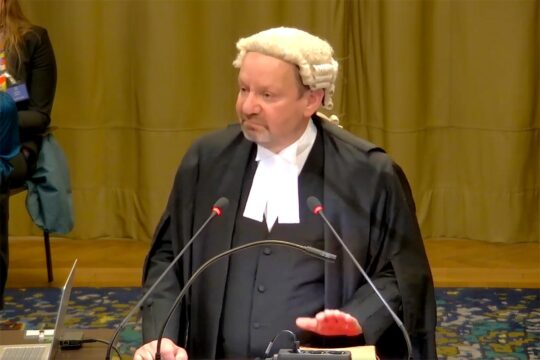“The deaths were on the hills of Kibuye in April but Ndindabahizi was not there”, Besnier declared. ” In April, May and June, Rwanda was inhabited by demons. Death lurked in Kibuye hills but all the Hutus did not become demons. ”“It is the task of the defence to demonstrate that accused was one of those who underwent hell but tried to preserve his dignity without supporting the killings of Tutsis”, Besnier said. The lead counsel added that the charges against Ndindabahizi “are neither solid nor true”. Ndindabahizi 53, is charged with three counts including genocide and crimes against humanity (extermination and murder). He allegedly perpetrated massacres of civilians in his home prefecture of Kibuye, western Rwanda. Besnier further stressed that the defence will go beyond refuting the evidence of the prosecution. “We are not afraid of facing the facts”. He said it was strange that according to the prosecution, the mere presence of Ndindabahizi in Kibuye amounted to incitement to kill. He also questioned why the suspect was indicted seven years after the genocide. Besnier told the chamber that witnesses who had testified in five completed cases about the killings in Gitwa and Bisesero, both in Rwanda and at the ICTR, had not mentioned Ndindabahizi. And neither did expert witness Alison Des Forges mention Ndindabahizi in her book entitled “Leave none to tell the story”, Besnier stated. Testimonies move fastAfter Besnier completed his opening statement, he proceeded to call his witnesses who are mainly Tutsi survivors from Kibuye. The evidence of four defence witnesses was heard within a day. Evidence of the first witness, code named DJ, to keep his identity secret was entirely heard in closed session. Most of the evidence of the second witness, DG, was also in closed session. DG defended Ndindabahizi against accusations that he perpetrated massacres in Kibuye. ”These allegations are false. He was never involved in crimes committed in 1994,” DH said. During cross examination by the prosecutor Charles Adeogun-Phillips (Nigeria), the witness added that the accused had visited Gacharu cellule in June 1994 and organised a meeting to stop the killings of Tutsis. Asked by the prosecutor how he knew about what the suspect had said in the meeting whereas he was hiding, DG said he heard it from other people. The third defence witness, DH, testified that Ndindabahazi asked people at Gitaka to stop the killings. He also denied that the suspect was behind the killing of his father at Gitaka shopping centre. The last defence witness of the day, DI, a female Tutsi survivor, stated that the accused was angry and shocked about the deaths of Tutsis at Gitaka. According to her, Ndindabahizi arrested one attacker while another escaped. Ndindabahizi trial is before Trial Chamber One composed of Judge Erik Mose (Norway) presiding, assisted by judges Khalida Rachid Khan (Pakistan) and Solomy Balungi Bossa (Uganda). PJ/CE/FH (NB'1027e)
Countries
- Afghanistan
- Algeria
- Angola
- Argentina
- Armenia
- Australia
- Austria
- Azerbaijan
- Bahrain
- Bangladesh
- Belarus
- Belgium
- Benin
- Bosnia & Herzegovina
- Brazil
- Burkina Faso
- Burundi
- Cambodia
- Cameroon
- Canada
- Central African Republic
- Chad
- Chile
- China
- Colombia
- Cote d’Ivoire
- Croatia
- Cyprus
- Dem. Rep. Of Congo
- Denmark
- Ecuador
- Egypt
- El Salvador
- Equatorial Guinea
- Eritrea
- Ethiopia
- Finland
- France
- Gabon
- Gambia
- Georgia
- Germany
- Ghana
- Greenland
- Guatemala
- Guinea
- Haiti
- Honduras
- Hungary
- Indonesia
- Iran
- Iraq
- Ireland
- Israel
- Italy
- Japan
- Jordan
- Kenya
- Kosovo
- Laos
- Lebanon
- Liberia
- Libya
- Lithuania
- Malaysia
- Maldives
- Mali
- Mauritania
- Mauritius
- Mexico
- Myanmar
- Namibia
- Nepal
- Netherlands
- New Zealand
- Nicaragua
- Niger
- Nigeria
- North Korea
- Norway
- Pakistan
- Palestine
- Peru
- Philippines
- Poland
- Republic of Congo
- Russia
- Rwanda
- Scotland
- Senegal
- Serbia
- Seychelles
- Sierra Leone
- Somaliland
- South Africa
- South Korea
- South Sudan
- Spain
- Sri Lanka
- Sudan
- Suriname
- Sweden
- Switzerland
- Syria
- Taiwan
- Tanzania
- Thailand
- Timor-Leste
- Togo
- Tunisia
- Turkey
- Uganda
- Ukraine
- United Arab Emirates
- United Kingdom
- United States
- Uruguay
- Vanuatu
- Venezuela
- Vietnam
- Yemen
- Zimbabwe



